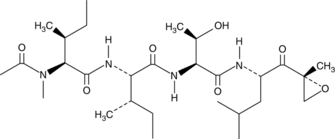Territorial Availability: Available through Bertin Technologies only in France
- Synonyms
- N-acetyl-N-methyl-L-isoleucyl-L-isoleucyl-N-[(1S)-3-methyl-1-[[(2R)-2-methyloxiranyl]carbonyl]butyl]-L-threoninamide
- Correlated keywords
- inhibitors inhibits inhibition proteins degradation 20S proteasomes antitumors bones formation Parkinsons diseases anti-tumors
- Product Overview:
Epoxomicin is a potent anti-tumor agent isolated from Actinomycetes that is used as a selective and irreversible inhibitor of the 20S proteasome. It inhibits proteasome activity in cell growth assays with an IC50 value of 4 nM and demonstrates potent cytotoxicity against B16-F10, HCT116, and Moser solid tumor cells, as well as P388 and K562 leukemia cells with IC50 values ranging from 2-44 nM.{13359,13358} By inhibiting osteoblast proteasome activity, epoxomicin stimulates bone formation at concentrations as low as 10 nM.{13351} Intraperitoneal injection of 1.5 mg/kg epoxomicin given daily for two weeks induces Parkinson’s-like symptoms in rats and addition of 100 nM epoxomicin to rat ventral midbrain cultures results in apoptosis specific to dopaminergic neurons.{13355,16504} Epoxomicin-induced parkinsonism can be a useful model to examine mechanisms and therapies for the disease.
Cayman Chemical’s mission is to help make research possible by supplying scientists worldwide with the basic research tools necessary for advancing human and animal health. Our utmost commitment to healthcare researchers is to offer the highest quality products with an affordable pricing policy.
Our scientists are experts in the synthesis, purification, and characterization of biochemicals ranging from small drug-like heterocycles to complex biolipids, fatty acids, and many others. We are also highly skilled in all aspects of assay and antibody development, protein expression, crystallization, and structure determination.
Over the past thirty years, Cayman developed a deep knowledge base in lipid biochemistry, including research involving the arachidonic acid cascade, inositol phosphates, and cannabinoids. This knowledge enabled the production of reagents of exceptional quality for cancer, oxidative injury, epigenetics, neuroscience, inflammation, metabolism, and many additional lines of research.
Our organic and analytical chemists specialize in the rapid development of manufacturing processes and analytical methods to carry out clinical and commercial GMP-API production. Pre-clinical drug discovery efforts are currently underway in the areas of bone restoration and repair, muscular dystrophy, oncology, and inflammation. A separate group of Ph.D.-level scientists are dedicated to offering Hit-to-Lead Discovery and Profiling Services for epigenetic targets. Our knowledgeable chemists can be contracted to perform complete sample analysis for analytes measured by the majority of our assays. We also offer a wide range of analytical services using LC-MS/MS, HPLC, GC, and many other techniques.
Accreditations
ISO/IEC 17025:2005
ISO Guide 34:2009
Cayman is a leader in the field of emerging drugs of abuse, providing high-purity Schedule I-V Controlled Substances to federally-licensed laboratories and qualified academic research institutions for forensic analyses. We are certified by ACLASS Accreditation Services with dual accreditation to ISO/IEC 17025:2005 and ISO Guide 34:2009.





